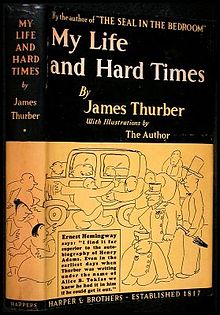- My Life and Hard Times
-
My Life and Hard Times is the 1933 autobiography of James Thurber. It is considered his greatest work as he relates in bewildered deadpan prose the eccentric goings on of his family and the town beyond (Columbus, Ohio).
Characters include the maid who lives in constant fear of being hypnotised; a grandfather who believes that the American Civil War is still going on; a mother who fears electricity is leaking all over the house and Muggs, an Airedale Terrier that had a liking for biting people.
The book was a best seller and also achieved high critical praise. Russell Baker writing in the New York Times said it was "possibly the shortest and most elegant autobiography ever". Ogden Nash said it was "just about the best thing I ever read"', and Dorothy Parker said "Mad, I don't say. Genius I grant you."
References in the book
- The preface quotes from Benvenuto Cellini, Ford Madox Ford and F. Hopkinson Smith and refers to Ambrose Bierce, Walter Lippman, Stuart Chase and Robert Benchley.
- Chapter I ("The Night the Bed Fell") refers to the Army of the Potomac and the songs "Marching Through Georgia" and "Onward, Christian Soldiers".
- Chapter II ("The Car We Had to Push") mentions other autobiographers, Lincoln Steffens and Gertrude Atherton; the car in question is a Reo but several other automobiles of the time are also mentioned including a Thomas Flyer, Firestone-Columbus, Stevens-Duryea, Rambler, Winton, White Steamer and Pope-Toledo; also mentioned are a Victrola phonograph playing "Come Josephine in My Flying Machine" and Pearson's magazine.
- Chapter III ("The Day the Dam Broke") refers to the 1913 floods which devastated many areas of Ohio. In Columbus panic was caused by rumours that the Griggs Dam had broken (which proved to be untrue). Also mentioned are Nathan Bedford Forrest's calvalry, silent screen star W. S. Hart and a statue featuring General William Tecumseh Sherman, Edwin M. Stanton, Ulysses S. Grant and General Philip Sheridan.
- Chapter IV ("The Night the Ghost Got In") mentions General George Meade and Stonewall Jackson.
- Chapter V ("More Alarms at Night") in which the aforementioned Victrola plays a recitation by Nat Wills and also mentions singer Ernestine Schumann-Heink and a nightmare featuring Lillian Russell and President Grover Cleveland.
- Chapter VI ("A Sequence of Servants") includes one servant shooting at Welsbach gas mantles, another being hypnotized at B. F. Keith's theatre (reminding the author of the 1932 film Rasputin and the Empress starring Lionel Barrymore), and of another servant celebrating Jack Johnson's boxing victory over James J. Jeffries.
- Chapter VII ("The Dog That Bit People") mentions the Battle of Missionary Ridge and a Fuller Brush salesman being terrified by the dog.
- Chapter VIII ("University Days") features the author's time at Ohio State University including drilling with Springfield rifles and resembling comedian Bert Williams.
- Chapter IX ("Draft Board Nights") mentions the Memoirs of Ulysses S. Grant and a Lozier automobile.
Categories:- 1933 books
- Literary autobiographies
- Works by James Thurber
Wikimedia Foundation. 2010.

